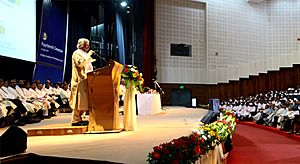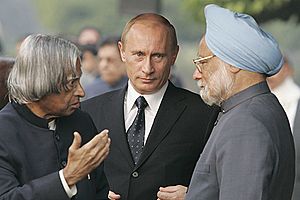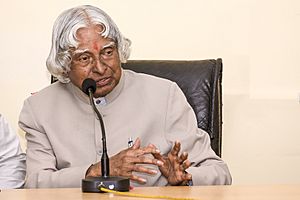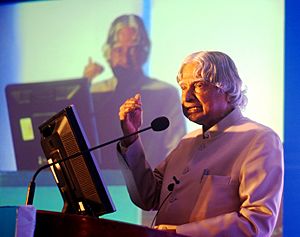A. P. J. Abdul Kalam facts for kids
Quick facts for kids
A. P. J. Abdul Kalam
|
|
|---|---|
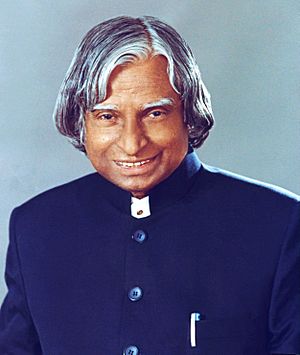
Official portrait, 2002
|
|
| 11th President of India | |
| In office 25 July 2002 – 25 July 2007 |
|
| Prime Minister | Atal Bihari Vajpayee Manmohan Singh |
| Vice President | Krishan Kant Bhairon Singh Shekhawat |
| Preceded by | K. R. Narayanan |
| Succeeded by | Pratibha Patil |
| 1st Principal Scientific Adviser to the Government of India | |
| In office November 1999 – November 2001 |
|
| President | K. R. Narayanan |
| Prime Minister | Atal Bihari Vajpayee |
| Preceded by | Office established |
| Succeeded by | Rajagopala Chidambaram |
| Personal details | |
| Born | 15 October 1931 Rameswaram, Tamil Nadu, India |
| Died | 27 July 2015 (aged 83) Shillong, Meghalaya, India |
| Resting place | Dr. A. P. J. Abdul Kalam Desiya Ninaivagam, Pei Karumbu, Rameswaram, Tamil Nadu, India |
| Political party | IND |
| Alma mater |
|
| Profession | |
| Awards | Full list |
| Notable work(s) |
|
| Signature |  |
| Scientific career | |
| Fields | Aerospace engineering |
| Institutions |
|
Avul Pakir Jainulabdeen Abdul Kalam (15 October 1931 – 27 July 2015) was an amazing Indian scientist and leader. He served as the 11th President of India from 2002 to 2007. Born and raised in Rameswaram, Tamil Nadu, he studied physics and aerospace engineering.
For about 40 years, he worked as a scientist and science manager. He spent most of his career at the Defence Research and Development Organisation (DRDO) and the Indian Space Research Organisation (ISRO). He was deeply involved in India's space program and its efforts to develop missiles. Because of his important work on ballistic missile and launch vehicle technology, he became known as the Missile Man of India. He also played a key role in India's Pokhran-II nuclear tests in 1998.
In 2002, Kalam was elected as India's 11th president. He had support from both the ruling party and the opposition. People often called him the "People's President". After his term, he went back to teaching, writing, and public service. He received many important awards, including the Bharat Ratna, which is India's highest civilian honor.
Kalam passed away on 27 July 2015, at the age of 83. He collapsed while giving a lecture at the Indian Institute of Management Shillong. Thousands of people, including important leaders, attended his funeral in his hometown of Rameswaram. He was buried with full state honors.
Contents
Early Life and Education
Avul Pakir Jainulabdeen Abdul Kalam was born on 15 October 1931. His family was Tamil Muslim and lived in Rameswaram, a pilgrimage town. His father, Jainulabdeen Marakayar, owned a boat and was an imam (a Muslim prayer leader). His mother, Ashiamma, was a housewife.
Kalam's family used to be wealthy traders and landowners. However, their businesses failed by the 1920s, and they became very poor. As a young boy, Kalam had to sell newspapers to help his family earn money.
In school, Kalam was a bright and hardworking student. He loved to learn and spent many hours studying, especially mathematics. After finishing school, he went to St. Joseph's College, Tiruchirappalli. He graduated with a degree in physics in 1954.
In 1955, he moved to Madras to study aerospace engineering at the Madras Institute of Technology. During a project, his dean was unhappy with his progress. The dean threatened to take away his scholarship if the project wasn't finished in three days. Kalam worked hard and met the deadline, which impressed the dean. He almost became a fighter pilot but narrowly missed out, as only eight spots were available.
Career as a Scientist
After graduating in 1960, Kalam joined the Defence Research and Development Organisation (DRDO) as a scientist. He started by designing a small hovercraft. Later, he joined the INCOSPAR, working with the famous space scientist Vikram Sarabhai.
In 1969, Kalam moved to the Indian Space Research Organisation (ISRO). There, he became the project director for India's first Satellite Launch Vehicle (SLV-III). This rocket successfully launched the Rohini satellite into orbit in July 1980. Kalam had started working on rockets independently at DRDO in 1965. In 1969, he got government approval to expand the program.
Between the 1970s and 1990s, Kalam worked on the Polar Satellite Launch Vehicle (PSLV) and SLV-III projects. Both of these projects were very successful.
Kalam also led two projects, Project Devil and Project Valiant. These projects aimed to develop ballistic missiles using technology from the successful SLV program. Even without full government approval, Prime Minister Indira Gandhi secretly provided funds for these projects under Kalam's leadership. Kalam was very good at convincing the government to keep these projects secret.
His leadership in research earned him great respect in the 1980s. This led the government to start an advanced missile program with him in charge. Kalam played a major role in developing many missiles for this program. These included Agni, a medium-range missile, and Prithvi, a tactical surface-to-surface missile.
From July 1992 to December 1999, Kalam was the Chief Scientific Adviser to the Prime Minister. He was also Secretary of the Defence Research and Development Organisation. During this time, the Pokhran-II nuclear tests took place, and he played a very important role. Media coverage during this period made him India's most famous nuclear scientist.
In 1998, Kalam worked with a heart doctor, Soma Raju. Together, they created a low-cost coronary stent, which was named the "Kalam-Raju Stent." In 2012, they also designed a tough tablet computer for healthcare in rural areas, called the "Kalam-Raju Tablet."
Presidency
| Presidential styles of A.P.J. Abdul Kalam |
|
|---|---|
 |
|
| Spoken style | President Abdul Kalam |
| Alternative style | Mr. President |
Kalam became the 11th president of India, taking over from K. R. Narayanan. He won the 2002 presidential election by a large number of votes. His term as president lasted from 25 July 2002, to 25 July 2007.
On 10 June 2002, the ruling party, the National Democratic Alliance (NDA), announced they would nominate Kalam for president. Both the Samajwadi Party and the Nationalist Congress Party also supported him. Because of this widespread support, the previous president, Narayanan, decided not to seek another term.
On 18 June, Kalam officially submitted his nomination papers. He was joined by the Prime Minister and other senior government officials.
The election took place on 15 July 2002. Many people believed Kalam's victory was certain. He easily won and became the 11th president of India. He moved into the Rashtrapati Bhavan (the President's official residence) after being sworn in on 25 July.
Kalam was the third President of India to have received the Bharat Ratna, India's highest civilian honor, before becoming president. He was also the first scientist and the first bachelor to hold the office.
During his time as president, he was lovingly called the People's President. He once said that signing the Office of Profit Bill was the hardest decision he made.
In September 2003, Kalam supported the idea of a Uniform Civil Code in India. This code would mean the same laws for all citizens, regardless of their religion.
At the end of his term, on 20 June 2007, Kalam was open to serving a second term if his victory was certain. However, two days later, he decided not to run again. He wanted to keep the President's residence out of political struggles.
In 2012, there were rumors that Kalam might be nominated for a second term. Many people on social media supported him. However, Kalam declined to run in the 2012 presidential election.
Post-Presidency
After leaving office, Kalam became a visiting professor at several top universities in India. These included the Indian Institute of Management Shillong, Indian Institute of Management Ahmedabad, and Indian Institute of Management Indore. He also taught aerospace engineering at Anna University.
In 2011, Kalam supported the Koodankulam Nuclear Power Plant. Some groups criticized him for this, saying he didn't talk enough with local people who were worried about the plant's safety.
In May 2012, Kalam started a program for young people called the What Can I Give Movement. Its main goal was to fight corruption.
Death
On 27 July 2015, Kalam went to Shillong to give a lecture. He felt some discomfort while climbing stairs but still went into the auditorium. About five minutes into his lecture, he collapsed. He was quickly taken to Bethany Hospital but had no pulse or signs of life. Doctors confirmed he had died from a sudden cardiac arrest at 7:45 p.m. IST. His last words to his aide were reportedly: "Funny guy! Are you doing well?"
After his death, Kalam's body was flown from Shillong to New Delhi. The President, Prime Minister, and other important leaders received his body. It was then taken to his home in Delhi, where many people paid their respects.
On 29 July, Kalam's body was flown to Madurai and then by helicopter to Mandapam. From there, it was taken by truck to his hometown of Rameswaram. His body was displayed for the public to pay their final respects.
On 30 July 2015, the former president was buried in Rameswaram with full state honors. Over 350,000 people attended the funeral, including the Prime Minister and chief ministers from several states.
Reactions to His Death
India reacted to Kalam's death with great sadness. Many tributes were paid across the country and on social media. The Indian government declared a seven-day period of national mourning.
Leaders from across South Asia also expressed their condolences. The Bhutanese government lowered its flags and lit butter lamps in his honor. Bhutanese Prime Minister Tshering Tobgay said Kalam was "a leader greatly admired by all people, especially the youth of India."
Bangladesh Prime Minister Sheikh Hasina called Kalam "a rare combination of a great statesman, acclaimed scientist, and a source of inspiration." The President and Prime Minister of Pakistan also expressed their grief. The President of Sri Lanka said Kalam was "a man of firm conviction and indomitable spirit."
United States President Barack Obama sent his "deepest condolences." He praised Kalam's achievements as a scientist and leader, especially his role in strengthening relations between the US and India. Obama called him "the People's President."
Russian President Vladimir Putin also expressed his sympathy. He noted Kalam's "outstanding personal contribution to the social, economic, scientific, and technical progress of India." The Secretary-General of the United Nations, Ban Ki-moon, signed a condolence book, calling Kalam "a great statesman."
Memorial
The Dr. A. P. J. Abdul Kalam National Memorial was built in his memory. It is located in Pei Karumbu, Rameswaram, Tamil Nadu. Prime Minister Narendra Modi opened it in July 2017. The memorial displays models of rockets and missiles Kalam worked on. It also has paintings and portraits showing his life. There is a statue of Kalam playing the Veena (an Indian string instrument) at the entrance.
Personal Life
Kalam was the youngest of five children. He had a sister and three older brothers. He was very close to his family throughout his life. He often sent money to his older relatives. He remained a bachelor his entire life.
Kalam was known for his honesty and simple way of living. He never owned a television. He usually woke up early, around 6:30 or 7 a.m., and went to bed around 2 a.m. His few personal belongings included his books, his veena, some clothes, a CD player, and a laptop. He did not leave a will, so his possessions went to his eldest brother, who outlived him.
Religious and Spiritual Views
Religion and spirituality were very important to Kalam. He wrote about his own spiritual journey in his last book, Transcendence: My Spiritual Experiences with Pramukh Swamiji.
Islam
Kalam was a proud and practicing Muslim. Daily prayers (namaz) and fasting during Ramadan were a big part of his life. His father, who was an imam in Rameswaram, taught him these Islamic customs. His father also taught him to respect and talk with people of other faiths.
Kalam remembered that his father, a Hindu temple priest, and a church priest would often sit together and discuss issues. This early experience taught Kalam that "dialogue and cooperation" among different religious and social leaders could solve India's problems. He believed that "respect for other faiths" was a key part of Islam. He often said: "For great men, religion is a way of making friends; small people make religion a fighting tool."
Respect for All Faiths
Kalam was popular among many different groups in India because he respected various spiritual and cultural traditions. Besides his faith in the Quran and Islamic practices, Kalam also knew a lot about Hindu traditions. He learned Sanskrit and read the Bhagavad Gita. He was also a vegetarian.
Kalam enjoyed writing Tamil poetry, playing the veena, and listening to Carnatic music every day. In 2002, after becoming president, he spoke about his wish for a more united India. He said he wanted to work for "unity of minds among the divergent traditions of our country."
Leaders from different political parties praised Kalam for bringing people together. They said he showed the best of India's diverse heritage.
Pramukh Swami as a Spiritual Teacher
Kalam wanted to meet spiritual leaders to help create a better, more unified India. This led him to meet Pramukh Swami, a Hindu guru. Kalam came to see Pramukh Swami as his main spiritual teacher.
Their first meeting was on 30 June 2001. Kalam felt immediately drawn to Pramukh Swami's simple and pure spirit. Kalam said he was inspired by Pramukh Swami during their many meetings. One example was after a terrorist attack on a temple in 2002. Pramukh Swami prayed for everyone who died, including the terrorists, showing that all human life is sacred. Kalam was deeply moved by this act of kindness.
Kalam said that Pramukh Swami "has indeed transformed me. He is the ultimate stage of the spiritual ascent in my life."
Writings
In his book India 2020, Kalam strongly suggested a plan to make India a "knowledge superpower" and a developed nation by 2020. He believed his work on India's nuclear weapons program helped India become a future superpower.
Kalam described a special moment when he asked Pramukh Swami how India could achieve its vision of development. Pramukh Swami suggested adding a sixth area: developing faith in God and spirituality to fight crime and corruption. This idea became a spiritual guide for Kalam's life for the next 15 years. He wrote about it in his last book, Transcendence: My Spiritual Experiences with Pramukh Swamiji.
It was reported that many people in South Korea wanted translated versions of his books.
Kalam was also interested in other scientific and technological developments. He supported open source technology over paid software. He believed that using free software widely would help more people benefit from information technology.
After leaving his role as scientific adviser in 1999, Kalam aimed to talk with 100,000 students. He said, "I feel comfortable in the company of young people... I intend to share with them experiences, helping them to ignite their imagination." His dream was for every student to achieve great things.
Awards and Honours
Kalam received 7 honorary doctorates from 40 universities. The Government of India honored him with the Padma Bhushan in 1981 and the Padma Vibhushan in 1990 for his work in space and defense. In 1997, Kalam received India's highest civilian honor, the Bharat Ratna. This was for his contributions to science and defense technology. In 2013, he received the Von Braun Award for his leadership in space projects.
In 2012, Kalam was ranked second in a poll by Outlook India for "the Greatest Indian."
After his death, Kalam received many tributes. The Tamil Nadu state government announced that his birthday, 15 October, would be celebrated as "Youth Renaissance Day." They also created the "Dr. A. P. J. Abdul Kalam Award" for achievements in science, humanities, or student welfare.
On his birthday in 2015, the CBSE set topics for an expression series in his name.
Prime Minister Narendra Modi released postage stamps honoring Kalam on 15 October 2015, his 84th birthday.
Scientists at NASA's Jet Propulsion Laboratory (JPL) found a new bacterium on the International Space Station. They named it Solibacillus kalamii to honor Dr. A. P. J. Abdul Kalam.
Many educational and scientific places were renamed or named after Kalam after his death:
- Kerala Technological University was renamed A P J Abdul Kalam Technological University.
- An agricultural college in Kishanganj, Bihar, was renamed the "Dr. Kalam Agricultural College."
- India's First Medical Tech Institute was named Kalam Institute of Health Technology.
- Uttar Pradesh Technical University (UPTU) was renamed A. P. J. Abdul Kalam Technical University.
- A new research institute in Kollam, Kerala, was named A. P. J. Abdul Kalam Memorial Travancore Institute of Digestive Diseases.
- A new academic complex at Mahatma Gandhi University in Kerala.
- Construction of Dr. A. P. J. Abdul Kalam Science City started in Patna in 2019.
- A new science center and planetarium in Lawspet, Puducherry.
- India and the US launched the Fulbright-Kalam Climate Fellowship in 2014.
- Dr APJ Abdul Kalam Planetarium in Burla, Sambalpur, Odisha was named after him.
Island
Wheeler Island, a missile test site in Odisha, was renamed Abdul Kalam Island in September 2015.
Road
A famous road in New Delhi was renamed from Aurangzeb Road to Dr APJ Abdul Kalam Road in August 2015.
Plant Species
In February 2018, scientists named a newly found plant species Drypetes kalamii in his honor.
Other Awards and Honours
| Year of award or honour | Name of award or honour | Awarding organisation |
|---|---|---|
| 2014 | Honorary professor | Beijing University, China |
| 2014 | Doctor of Science | Edinburgh University, UK |
| 2013 | Von Braun Award | National Space Society |
| 2012 | Doctor of Laws (Honoris Causa) | Simon Fraser University |
| 2011 | IEEE Honorary Membership | IEEE |
| 2010 | Doctor of Engineering | University of Waterloo |
| 2009 | Honorary Doctorate | Oakland University |
| 2009 | Hoover Medal | ASME Foundation, USA |
| 2009 | International von Kármán Wings Award | California Institute of Technology, USA |
| 2008 | Doctor of Science | Universiti Sains Malaysia |
| 2008 | Doctor of Engineering (Honoris Causa) | Nanyang Technological University, Singapore |
| 2008 | Doctor of Science (Honoris Causa) | Aligarh Muslim University, Aligarh |
| 2007 | Honorary Doctorate of Science and Technology | Carnegie Mellon University |
| 2007 | King Charles II Medal | Royal Society, UK |
| 2007 | Honorary Doctorate of Science | University of Wolverhampton, UK |
| 2000 | Ramanujan Award | Alwars Research Centre, Chennai |
| 1998 | Veer Savarkar Award | Government of India |
| 1997 | Indira Gandhi Award for National Integration | Indian National Congress |
| 1997 | Bharat Ratna | President of India |
| 1995 | Honorary Fellow | National Academy of Medical Sciences, |
| 1994 | Distinguished Fellow | Institute of Directors (India) |
| 1990 | Padma Vibhushan | Government of India |
| 1981 | Padma Bhushan | Government of India |
Legacy
Books, Documentaries, and Popular Culture
- Kalam's Writings
- Developments in Fluid Mechanics and Space Technology by A P J Abdul Kalam and Roddam Narasimha; Indian Academy of Sciences, 1988.
- India 2020: A Vision for the New Millennium by A P J Abdul Kalam, Y. S. Rajan; New York, 1998.
- Wings of Fire: An Autobiography by A P J Abdul Kalam, Arun Tiwari; Universities Press, 1999.
- Ignited Minds: Unleashing the Power Within India by A P J Abdul Kalam; Viking, 2002.
- The Luminous Sparks by A P J Abdul Kalam, by; Punya Publishing Pvt Ltd., 2004.
- Mission India by A P J Abdul Kalam, Paintings by Manav Gupta; Penguin Books, 2005
- Inspiring Thoughts by A P J Abdul Kalam; Rajpal & Sons, 2007
- Indomitable Spirit by A P J Abdul Kalam; Rajpal & Sons Publishing
- Envisioning an Empowered Nation by A P J Abdul Kalam with A Sivathanu Pillai; Tata McGraw-Hill, New Delhi
- You Are Born To Blossom: Take My Journey Beyond by A P J Abdul Kalam and Arun Tiwari; Ocean Books, 2011.
- Turning Points: A journey through challenges by A P J Abdul Kalam; HarperCollins India, 2012.
- Target 3 Billion by A P J Abdul Kalam and Srijan Pal Singh; December 2011 (Publisher: Penguin Books).
- My Journey: Transforming Dreams into Actions by A P J Abdul Kalam; 2014 by the Rupa Publication.
- A Manifesto for Change: A Sequel to India 2020 by A P J Abdul Kalam and V Ponraj; July 2014 by HarperCollins.
- Forge your Future: Candid, Forthright, Inspiring by A P J Abdul Kalam; by Rajpal & Sons, 29 October 2014.
- Reignited: Scientific Pathways to a Brighter Future by A P J Abdul Kalam and Srijan Pal Singh; by Penguin India, 14 May 2015.
- Transcendence: My Spiritual Experiences with Pramukh Swamiji by A P J Abdul Kalam with Arun Tiwari; HarperCollins Publishers, June 2015
- Advantage India: From Challenge to Opportunity by A P J Abdul Kalam and Srijan Pal Singh; HarperCollins Publishers,15 October 2015.
- Biographies
- Eternal Quest: Life and Times of Dr Kalam by S Chandra; Pentagon Publishers, 2002.
- President A P J Abdul Kalam by R K Pruthi; Anmol Publications, 2002.
- A P J Abdul Kalam: The Visionary of India by K Bhushan, G Katyal; A P H Pub Corp, 2002.
- A Little Dream (documentary film) by P. Dhanapal; Minveli Media Works Private Limited, 2008.
- The Kalam Effect: My Years with the President by P M Nair; HarperCollins, 2008.
- My Days With Mahatma Abdul Kalam by Fr A K George; Novel Corporation, 2009.
- A.P.J. Abdul Kalam: A Life by Arun Tiwari; Harper Collins, 2015.
- The People's President: Dr A P J Abdul Kalam by S M Khan; Bloomsbury Publishing, 2016.
- Popular Culture
- In the 2011 Hindi film I Am Kalam, Kalam is shown as a positive influence on a poor but smart boy named Chhotu. The boy renames himself Kalam to honor his hero.
- My Hero Kalam is a 2018 Indian Kannada-language film that shows his life from childhood to the nuclear tests.
- People's President is a 2016 Indian documentary that covers Kalam's life.
- Mega Icons (2018–2020), a TV series about famous Indians, featured an episode on Kalam's life.
- Soorarai Pottru, a 2020 film about the Indian aviation industry, featured a character similar to Kalam.
- Rocket Boys'', an Indian Hindi-language Biographical streaming television series, featured Kalam as a character played by Arjun Radhakrishnan.
See Also
 In Spanish: Abdul Kalam para niños
In Spanish: Abdul Kalam para niños
- 2002 Indian presidential election
- List of presidents of India
- Pokhran-II
- The Greatest Indian
Images for kids


